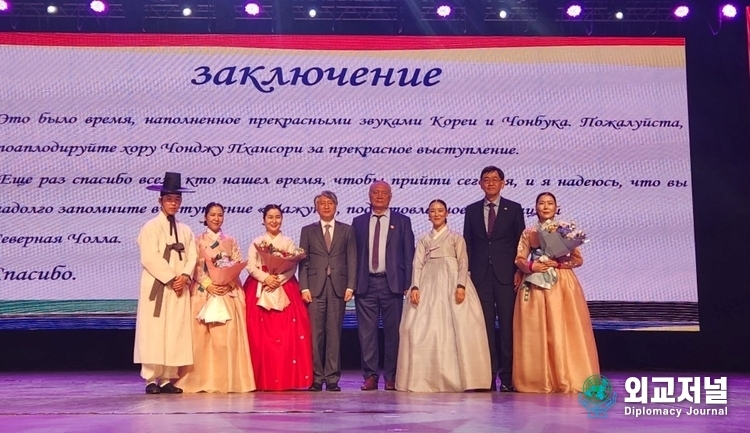By Reporter Anna Kim
Following a visit to Kazakhstan on June 17-19, a delegation of Jeollabuk-do visited Kyrgyzstan to promote Jeollabuk-do culture.

On June 20 and 21, the delegation led by Jeollabuk-do Ambassador for International Relations Ryu Chang-soo visited Kyrgyzstan. Kyrgyzstan is known as the Switzerland of Central Asia and is a blessed agricultural country with excellent quality of agricultural and dairy products in Central Asia.
The delegation organized various public diplomacy events and established a network of cooperation with the Korean people and local universities.
First, the delegation met with Han Bezeslav, President of the Kyrgyz Association of Koreans in Kyrgyzstan, and Kim Yoo-ri, Editor-in-Chief of the Ilchi Newspaper, to discuss cultural cooperation.
They then met with Baek Tae-hyun, President of the Korean Institute of Central Asia (KICA), to discuss Korean language education in Kyrgyzstan. Kyrgyzstan has a high level of interest in Korea, with a total of 16 universities offering Korean language classes as a major or minor, so Do requested cooperation in attracting international students from Kyrgyzstan to universities in the country.
At the Bishkek's Philharmonia, a traditional performance of Jeollabuk-do was held. Members of the Namwon National Folk Gugak Center's Suh Bang-mi and other performers presented the essence of Korean culture, including pansori simchunga, seoljanggu, haegeum, and Kyrgyz folk songs.
In particular, more than 800 people, including the deputy ministers of Kyrgyzstan's central ministries of foreign affairs, culture, and energy, as well as Soyuzbek Nadyrbekov, director of the National Museum of Culture, Kongantiev Kuvanychek, mayor of Bishkek, international organizations such as UNDP, UNICEF, and FAO, and ambassadors of various countries in Kyrgyzstan, watched the performance and showed great interest.
In addition, traditional culture courses such as folk painting, hanji craft making, and folk song classes were held for Kazakhstan's Korean community to promote Jeollabuk-do, the home of Korean traditional culture.
The province plans to take advantage of the exchange with Central Asian countries such as Kazakhstan and Kyrgyzstan to promote various activities such as supporting traditional culture training for Koreans and attracting international students.
Meanwhile, Kyrgyzstan is home to about 17,000 Koreans who were forcibly relocated from Russia in 1937. Although they make up 0.3% of Kyrgyzstan's population, they are highly educated, with a tertiary education rate that is more than double the Kyrgyz average. They are also highly represented in professional and white-collar jobs, making them one of the most influential ethnic minorities in the country's political, economic, social, and cultural spheres.


